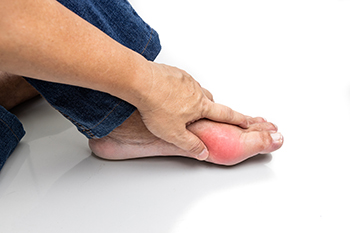Causes and Symptoms of Gout
Tuesday, 26 December 2023 00:00
Gout, a form of inflammatory arthritis, arises from an excess of uric acid in the bloodstream, resulting in the formation of urate crystals within the body's tissues. These crystals, mainly concentrated in joints, trigger inflammation and lead to pain, redness, heat, and swelling. Gout symptoms occur suddenly and primarily affect a single joint, such as the big toe. The pain is intense, with heightened sensitivity to touch. Many factors can contribute to heightened uric acid levels, including genetics, obesity, and specific medications like diuretics. High blood pressure, surgery, trauma, dehydration, and kidney disease may also elevate the risk of developing gout. Surprisingly, even medications aimed at lowering uric acid levels may initiate gout flares. Tophi, hard nodules of uric acid beneath the skin, signify prolonged elevated uric acid levels. The presence of tophi demands immediate attention from a podiatrist. Left untreated, gout can result in joint damage, physical deformities, and kidney stones. If you suspect gout, it is suggested that you consult a podiatrist for an examination and a personalized treatment plan.
Gout is a painful condition that can be treated. If you are seeking treatment, contact one of our podiatrists from Family Foot Care. Our doctors will treat your foot and ankle needs.
What Is Gout?
Gout is a form of arthritis that is characterized by sudden, severe attacks of pain, redness, and tenderness in the joints. The condition usually affects the joint at the base of the big toe. A gout attack can occur at any random time, such as the middle of the night while you are asleep.
Symptoms
- Intense Joint Pain - Usually around the large joint of your big toe, and it most severe within the first four to twelve hours
- Lingering Discomfort - Joint discomfort may last from a few days to a few weeks
- Inflammation and Redness -Affected joints may become swollen, tender, warm and red
- Limited Range of Motion - May experience a decrease in joint mobility
Risk Factors
- Genetics - If family members have gout, you’re more likely to have it
- Medications - Diuretic medications can raise uric acid levels
- Gender/Age - Gout is more common in men until the age of 60. It is believed that estrogen protects women until that point
- Diet - Eating red meat and shellfish increases your risk
- Alcohol - Having more than two alcoholic drinks per day increases your risk
- Obesity - Obese people are at a higher risk for gout
Prior to visiting your podiatrist to receive treatment for gout, there are a few things you should do beforehand. If you have gout you should write down your symptoms--including when they started and how often you experience them, important medical information you may have, and any questions you may have. Writing down these three things will help your podiatrist in assessing your specific situation so that he or she may provide the best route of treatment for you.
If you have any questions, please feel free to contact our offices located in Valatie and Albany, NY . We offer the newest diagnostic and treatment technologies for all your foot care needs.



